#eternal revue
Explore tagged Tumblr posts
Text
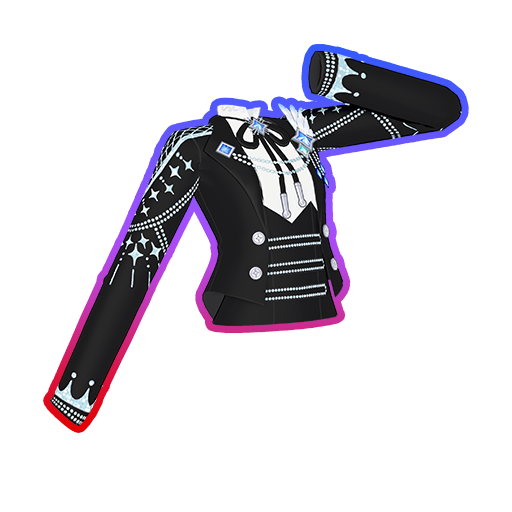



タキシードブラック - Tuxedo Black
#waccha primagi!#primagi#eternal revue#celeb#super rare#live#tuxedo black#tuxedo#primagi studio chapter 2#coords#coord#black#silver#blue
41 notes
·
View notes
Text
There is NOTHING on this godforsaken earth that will make the girlies reach the pinnacle of their artistic expression like doomed yuri. I go into the madohomu tag and Michelangelo is in there. Van Gogh is rolling himself a joint after posting mizisua art. Picasso is snorting coke with revue starlight fans. And let's not even get into whatever the locked tomb girlies have got goin on
#puella magi madoka magica#madohomu#alien stage#mizisua#revue starlight#the locked tomb#Everytime two women are destined to die eternally in every timeline and they kiss about it an artist#gets scorching burning inspiration from the muses high above.#tlt#alnst#pmmm
908 notes
·
View notes
Text

See you next year.
#revue starlight#revstar#daiba nana#nana daiba#shoujo kageki revue starlight#ramblerogue#illustration#artists on tumblr#fan art#helloooooo everyone please look at my beloved most sweetest most totally normal girl in the whole world#daiba nana is an eternal character to me#she's everything#like i will Always be insane about her i love her SO much#she should never change (and I think she'd agree with me about not changing and keeping things Exactly The Same lol)#ANYWAY EVERYONE GO WATCH REVUE STARLIGHT!!!#fun fact i started this drawing about... a year and a half ago. got half way through and then dropped it for like a year#so im pretty pleased that it's finally finished i hope you all like it :]#fighting for my life trying to do lineless coloring however i like how the end product turned out haha#also praying hoping to god that the image quality doesn't turn to shit#pls click into it if so i dont know how to fix that
739 notes
·
View notes
Text


tsukishiro kanato and umino mitsuki in eternal voice — 2024.
#takarazuka#takarazuka revue#tkz#umino mitsuki#tsukishiro kanato#reikoumi#reikoumi forever..#eternal voice#tsukigumi#moon troupe#月城 かなと#��乃 美月#tkz gifs
37 notes
·
View notes
Text
im like i wish there were a different way to respond to peoples tags than just reblogging the post over and over but also thats kind of funny on its own
#I feel embarassed to reblog my own art over and over but i love you mutual gearbits#the emurui revue would be CRAZY. revue of dreams tear that shit apart#me and the mutuals have often agreed those two are the main contenders for a 'Nana' type deurtsgonist situation#if wxs were in a revue situation. i wonder who would be the one fighting to give it up and let them go vs the one to keep it for eternity#im an emu timeloop truther since ive also got the banana brain but curtaincall rui makes a good point. stupid idiot. Whats that face for.
3 notes
·
View notes
Text
every day I try to cover a new revue starlight song but I realize I can’t. it’s always my poor articulation, my range, or, most commonly, my inability to sing different characters. if anyone wants to like do an impromptu cover of dream of you I’m here
#revue starlight#if anyone wants to see my cover of eternity is dying and living i'm sorry#never unlisting that shit
2 notes
·
View notes
Text
i'm not sure how many dedicated necro girlies i can change the hearts of but i want to show off anyway
















Battle Couple Battle Round 2!
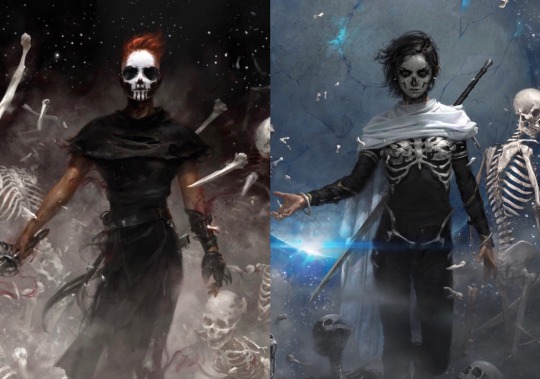
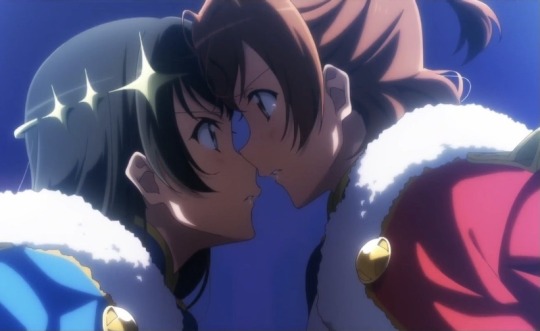
Griddlehark (The Locked Tomb) VS Hikaren (Shoujo Kageki Revue Starlight)
#''but harrow grieved for gideon and [htn spoilers]'' karen also did all that while ATTENDING PERFORMING ARTS HIGHSCHOOL.#objectively much worse than being in god's messiest discord server#hrgd made me cry and throw up for a month Karehika did that to me for half a year#also i think its honestly a bit prejudiced to brush Anything off bc its anime... just my opinion...#i've had to explain to so many people that yuri in animanga is made by and for a wlw audience and a lot of it is beautifully made#revue. genuinely. has one of the most batshit insane instrumentations out of anything i've listened to#if you buy the official scores there's so much Threatening Music Notation type shit#and a lot of that is for the love between these characters. like tlt revue is very much about exploring what is given/taken in relationship#karehika is the zenith of that...... they broke a timeloop for eachother. they broke canon for eachother. they extended the final act#a promise is a curse as much as it is a blessing. it binds two people for eternity... or so it is said.#karehika says. what if we change this too. what if we renew the promise and move on to happier lives#even if it doesnt necessarily mean we'll always be together physically?#their ultimate i love you is this: even apart they are stars. and they trust eachother to know that in the distance they are there.#they will see eachother's light shining brightly. just as bright as the promise they made when they were kids#they're eachother's.... starlight
3K notes
·
View notes
Text
I wish one of those folk musicians went hardcore into disco. I know we have marc bolan glam rock and for that I’m eternally grateful. I just wish a donovan like figure decided that disco was the way to go. I wish bob dylan wore glitter and satin suits directly after the rolling thunder revue. like get your white asses in some polyester and shake it. but unfortunately they were all guitar freaks about the acoustic or something like that and probably were too scared to have the bass leading the song 🙄
29 notes
·
View notes
Text

Retirement Conference Q&A: Takarazuka Revue Moon Troupe Top Star talks about the finale of the Sayonara Show, "It's good to end it with just the two of us"
(Source from Sanspo)
Takarazuka Revue Moon Troupe Top Star Tsukishiro Kanato embraced the closing performance on the 12th for her graduation performance "Eternal Voice"/"Grande TAKARAZUKA 110!" at the Takarazuka Grand Theatre on the 12th, bidding goodbye to the homebase. After the Sayonara Show, she appeared at the press conference. The following is the Q&A.
Q: Why did you choose the black tails?
Because there's still the Tokyo performances, and I'm still a Top Star, I'm still an otokoyaku, and it's far from the day I'm not living as my stage name and returning as myself yet. I chose the black tails to graduate at the Takarazuka Grand Theatre. Hayama (Kiomi)-sensei (a choreographer who passed away last June) always said, "Black tails is a costume without extra ornaments. That's the best thing to showcase in otokoyaku", so I wanted to present that myself too, and chose the black tails without other special design.
Q: You mentioned the god of stage in your speech.
I was able to finish the performance successfully today, that on the closing day I can enjoy this performance with my troupe members, and see the performance end without fail. As Top Star, I've always hoped that every performance would conclude successfully, but today as a graduating member, this feeling also stayed true, that when I'm able to embrace this closing day successfully and as a graduating member come down the grand staircase and give a speech, I think it's the god of stage watching over us, giving power to the graduates and also everyone in the troupe.
Q: How was the scenery on the grand staircase for the last time?
The graduates who went before me and other members were watching over me closely, and the graduates' faces were bright when they heard their name being called. Rather than the scenery before me when I came down the staircase, I'd say even now I remember much of how the underclassmen looked. Everyone looked so bright with beaming smiles, and that gave me strength to come down the staircase
What were you talking with Rei Makoto-san on stage?
It's a secret, I hope you understand.
What are your thoughts for the Sayonara Show?
The most memorable to me was when the graduates sang "Compass of Your Heart" (Rain on Neptune) and that was very good. It's a song with amazing lyrics, so rather than my song, this first comes to my mind. In the finale, it was my hope that it would be great if it were to end with just the two of us (with Umino). There are many Sayonara Shows that end with all of the troupe members or (the Top Star) alone, but now this is a Sayonara Show with Umino Mitsuki who has been with me until now, so I wanted to choose a song that was the most memorable to the two of us.
What does the Takarazuka Grand Theatre mean to you?
There's a great warmth filled in the Grand Theatre. A theatre that has such large capacity of power. There's the scenery from the opening day of my debut stage, and all of these experiences were in the Grand Theatre. All this time, I had been growing up with these various memories and experiences in this theatre. So it's a theatre that encapsulates so much energy.
What do you want to tell the next Top Star Houzuki An?
I don't have much grandeur to tell her, but during this time, I've had the chance to go to the Takarazuka Hall of Fame and I realise how many people have been part of creating Takarazuka till now. I think that all of that led to what we are today, and I felt proud and happy that I am affiliated as a member of (Takarazuka), so I believe this will continue to be relevant as Takarazuka continues to be loved by many when there are new Top Stars. That's what I think is so warm and amazing of Takarazuka.
#tsukigumi#takarazuka revue#retirement#graduation#tsukishiro kanato#houzuki an#umino mitsuki#hibiscustranslation
34 notes
·
View notes
Text

“Is it possible to aspire to be two different people at the same time, rolled into one? If so, the two-headed transplant of my musical backbone could only be Ike and Tina Turner. I wanted to be as snakelike as Ike and as scary-sexy as Tina. So should you. Ike and Tina Turner were the best soul group ever.”
/ From John Waters’ 2019 collection of essays Mr. Know-It-All /
Born on this day: musician, songwriter, guitarist, producer, bandleader and rock’n’roll pioneer Ike Turner (né Izear Luster Turner Jr, 5 November 1931 – 12 December 2007). From the late fifties until their acrimonious split in 1976 Turner and his fiercely glamorous raspy-voiced “bold soul sister” wife Tina Turner (the former Anna Mae Bullock) were the tempestuous royal couple of greasy, primal rhythm and blues. Yes, Ike’s reputation as a monster is warranted (especially once the cocaine addiction kicked in), but his trailblazing musical genius demands recognition. In the great 2023 documentary Little Richard: I Am Everything, one of the talking heads notes that Richard's piano playing was beholden to Turner’s, something Richard himself freely admitted (he raved that hearing “Rocket 88” by Ike Turner and His Kings of Rhythm in 1951 “made my big toe shoot up in my boot” and profoundly fired his own musical imagination. Richard borrowed the piano intro to “Rocket 88” for his own “Good Golly, Miss Molly”). Pictured: The eternally stylish Turners on the cover of the revue’s first-ever live album – released sixty years ago this month (November 1964). Find it on Spotify if you're curious - it rocks! John Waters is right: Ike and Tina Turner were the best soul group ever.
#ike and tina turner#ike and tina turner revue#ike turner#tina turner#anna mae bullock#rhythm and blues#soul music#soul diva#soul duo#john waters#processed conk#desperate rhythm and blues#greasy rhythm and blues#lobotomy room#fierce#african american#rocknroll#little richard
11 notes
·
View notes
Text
A strange looking horse stands upon the stage, illuminated by bright lights. Its neck is far too long to truly be considered a horse and the spotted pattern that runs the entirety of its skin is rather unusual, as well. It is an acquisition of the director D'Silva, according to the haggard stagehands who had to wrangle the beast, meant to be prop and actor both. He'd had a hunch that it would help create a truly one of a kind opera.
(It better, the stagehands had all grumbled in their hearts, or they wouldn't be able to recuperate the cost of buying the damn thing.)
Once two actresses step up to the T shaped marks on the stage, the curious beast swings its long neck to look at both girls with long lashed eyes. It blinks once, twice, and then nods its head.
The ground opens up beneath the two actresses, swallowing them into the darkness.
It is only for a brief moment, however, before they drop down on to a second stage. Unlike the empty stage up above, this new stage is littered with mannequins laying here and there. The mannequins piled lifelessly on the side of the silver haired maiden are awash in a layer of pure white feathers while the mannequins on the side of the lavender haired maiden are buried under cream feathers that fade to turquoise at the tips.
The two girls are the only two figures left standing upright in this veritable graveyard of a stage.
「 It is the blood of ancients that thrums through their veins. This is the only fate that awaits them at the end of their journeys. 」
Something flies overhead of the stage, spreading great wings to take flight.
「 But it is the blood of humans that tethers them to the ground. The blood of ancients promises them eternity, but the blood of humans ruthlessly cuts that eternity short. Their forevers will never be the same as anyone else's. 」
"I know..." The lavender haired girl says softly, voice barely carrying across the stage. She glances down at the mannequins grasping at the hem of her skirt and her hair that drags on the ground. "I've known... for a long time..."
The girl holds a heavy tome tightly to her chest, edges gilded and catching the light in a similar way to the star studded button that clasps her cloak.
"Sophia..." she introduces herself listlessly. "Black Eagles student... and priestess of Arcadia... village of humans and dragons."
@frauleindermorgen
revue of eternities
distress: authority +1
#📚 ic#📚 thread: revue of eternities#frauleindermorgen#📚 support: micaiah#//makes you wait a whole month and then hands you a fuckign giant post pls dont feel the need to match length :sob:#//mento illness about to happen here i think good luck girls#(421)
4 notes
·
View notes
Text
Welcome to Revenge of the Underrated!
Some of you asked me to put a "haven't watched both" to be more fair to the more unknown movies, but I've seen other tournaments doing this and I think it limits too much who can participate in the polls. So what I decided to do is a double elimination!
What does that mean? That means a movie has to lose twice to be eliminated. In other words, there will be a sorts of losers bracket that'll be part of main bracket. I'm undecided on whether to do this for only one round or the whole bracket, as it would make the tournament very long. Do let me know if you have any opinion about it.
Anyway, Revenge of the Underrated, Round 1:
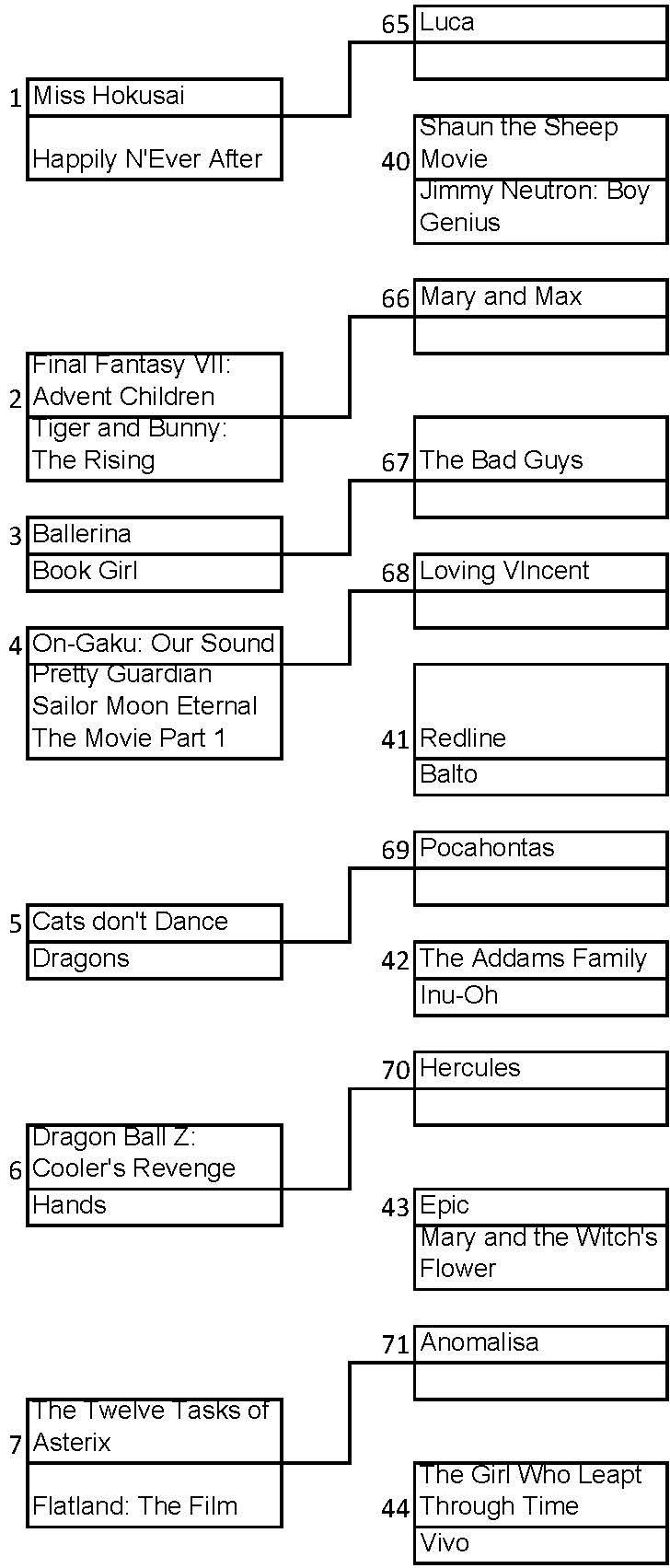
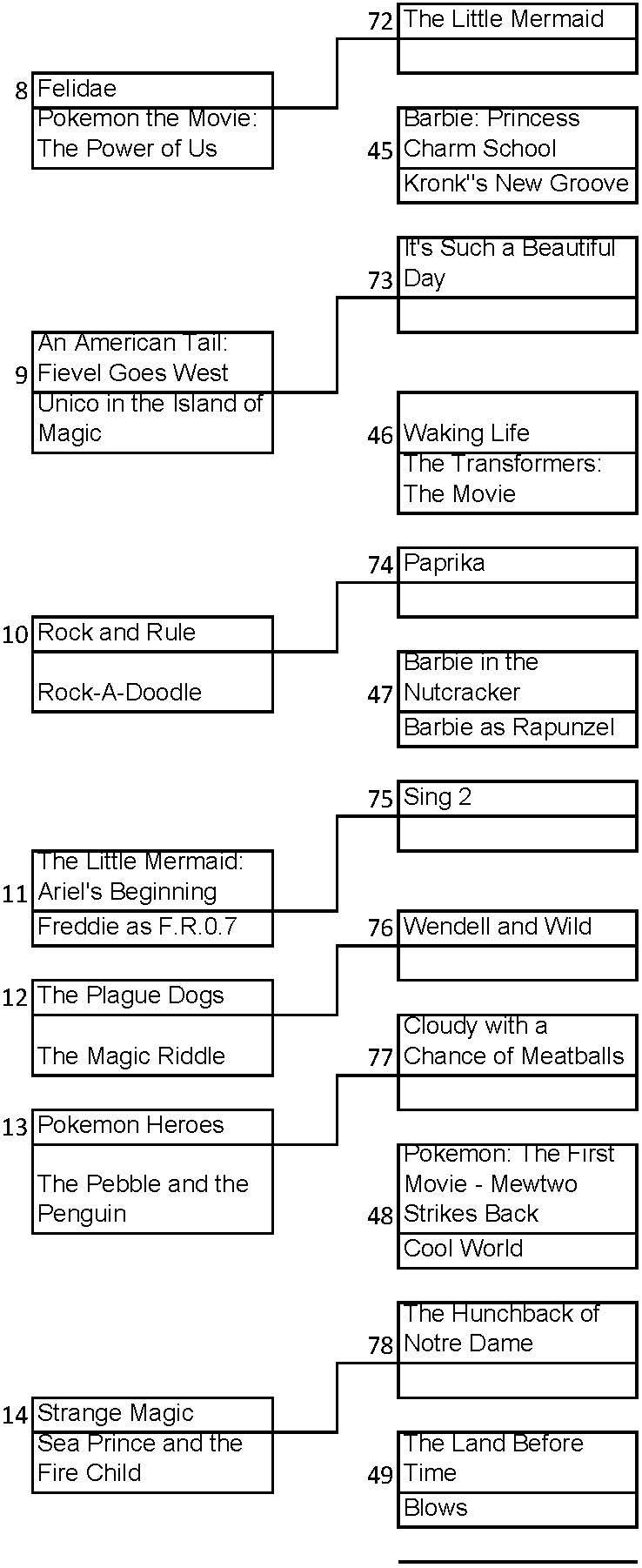
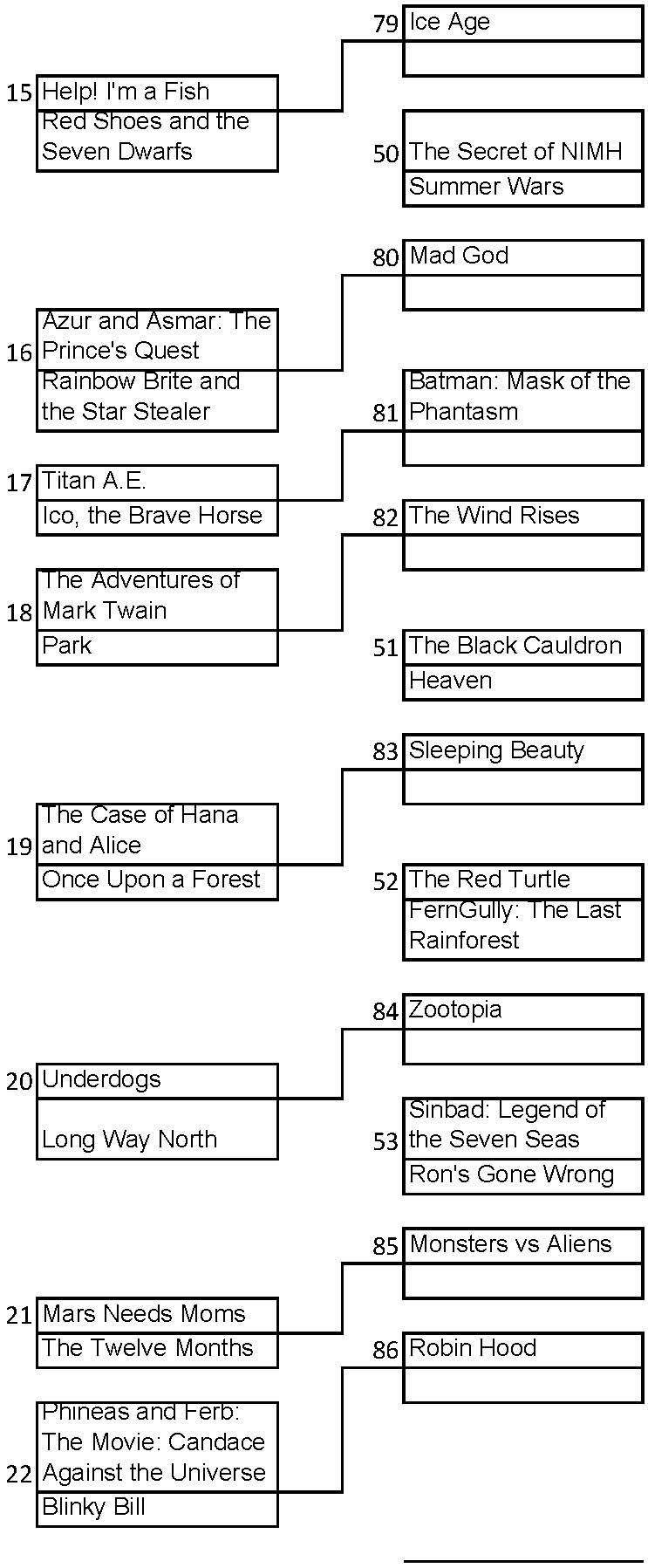

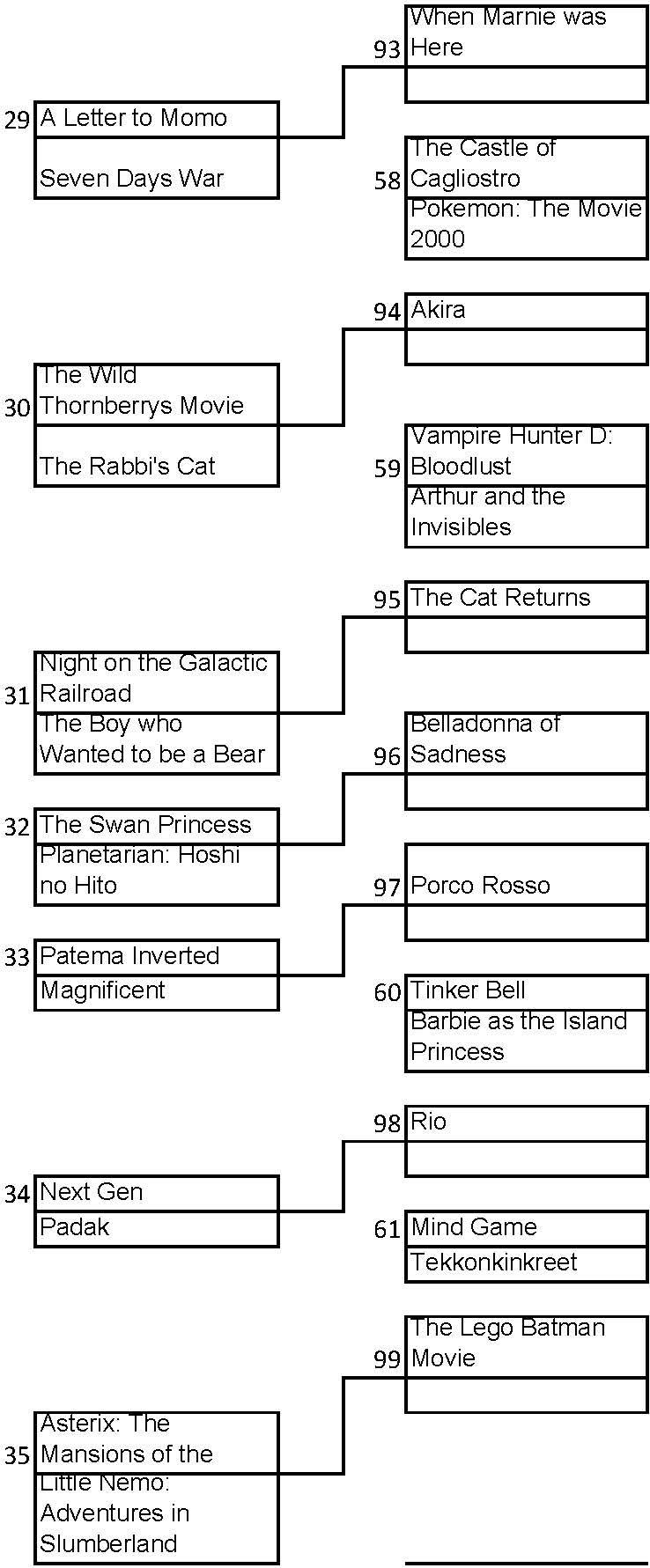

Miss Hokusai vs Happily N'Ever After
Final Fantasy VII: Advent Children vs Tiger and Bunny: The Rising
Ballerina vs Book Girl
On-Gaku: Our Sound vs Pretty Guardian Sailor Moon Eternal The Movie Part 1
Cats don't Dance vs The Flight of Dragons
Dragon Ball Z: Cooler's Revenge vs The Girl Without Hands
The Twelve Tasks of Asterix vs Flatland: The Film
Felidae vs Pokemon the Movie: The Power of Us
An American Tail: Fievel Goes West vs Unico in the Island of Magic
Rock and Rule vs Rock-A-Doodle
The Little Mermaid: Ariel's Beginning vs Freddie as F.R.0.7
The Plague Dogs vs The Magic Riddle
Pokemon Heroes vs The Pebble and the Penguin
Strange Magic vs Sea Prince and the Fire Child
Help! I'm a Fish vs Red Shoes and the Seven Dwarfs
16.Azur and Asmar: The Prince's Quest vs Rainbow Brite and the Star Stealer
17.Titan A.E. vs Ico, the Brave Horse
18.The Adventures of Mark Twain vs A Troll in Central Park
19.The Case of Hana and Alice vs Once Upon a Forest
20.Underdogs vs Long Way North
21.Mars Needs Moms vs The Twelve Months
22.Phineas and Ferb: The Movie: Candace Against the Universe vs Blinky Bill
23.Robot Carnival vs Revue Starlight: The Movie
24.One Piece: Baron Omatsuri and the Secret Island vs Winx Club: The Secret of the Lost Kingdom
25.Ruben Brandt, Collector vs Samurai Jack: The Premiere Movie
26.Lupin III: The First vs Pippi Longstocking
27.The Three Caballeros vs The Legend of Manxmouse
28.Princes and Princesses vs The Snow Queen
29.A Letter to Momo vs Seven Days War
30.The Wild Thornberrys Movie vs The Rabbi's Cat
31.Night on the Galactic Railroad vs The Boy who Wanted to be a Bear
32.The Swan Princess vs Planetarian: Hoshi no Hito
33.Patema Inverted vs Bartok the Magnificent
34.Next Gen vs Padak
35.Asterix: The Mansions of the Gods vs Little Nemo: Adventures in Slumberland
36.Thumbelina vs Catnapped!
37.Early Man vs Rainbow Magic: Return to Rainspell Island
38.Junk Head vs Hey Arnold! The Jungle Movie
39.Charlotte's Web (1973) vs The Princess and the Goblin
40.Shaun the Sheep Movie vs Jimmy Neutron: Boy Genius
41. Redline vs Balto
42. The Addams Family vs Inu-Oh
43. Epic vs Mary and the Witch's Flower
44.The Girl Who Leapt Through Time vs Vivo
45.Barbie: Princess Charm School vs Kronk''s New Groove
46.Waking Life vs The Transformers: The Movie
47.Barbie in the Nutcracker vs Barbie as Rapunzel
48.Pokemon: The First Movie - Mewtwo Strikes Back vs Cool World
49.The Land Before Time vs When the Wind Blows
50.The Secret of NIMH vs Summer Wars
51.The Black Cauldron vs All Dogs go to Heaven
52.The Red Turtle vs FernGully: The Last Rainforest
53.Sinbad: Legend of the Seven Seas vs Ron's Gone Wrong
54.The Boxtrolls vs Jin-Roh: The Wolf Brigade
55.Arthur Christmas vs One Piece Film Red
56.Barbie of Swan Lake vs The Rescuers Down Under
57.Legend of the Guardians: The Owls of Ga'Hoole vs Secret of the Wings
58.The Castle of Cagliostro vs Pokemon: The Movie 2000
59.Vampire Hunter D: Bloodlust vs Arthur and the Invisibles
60.Tinker Bell vs Barbie as the Island Princess
61.Mind Game vs Tekkonkinkreet
62.The Many Adventures of Winnie the Pooh vs Dragon Ball Super: Broly
63.Mirai vs Dragon Ball Super: Super Hero
64.The Lion King II: Simba's Pride vs Scooby-Doo! and the Cyber Chase
27 notes
·
View notes
Note
hello, I hope you are doing well
I am someone who only recently learnt about Takarazuka, but someone that really caught my attention is Yuki Amami. I was wondering if you could tell me some information about her time in Takarazuka since it's quite difficult to find information in English. I know she didn't stay for long time and that upon leaving she built a career for herself in the entertainment industry. My inquiries are about how like big she was, what she known for, what sort of persona did she embody, what her time was like as a student, any anecdotes about her time with revue honestly anything you could offer me would appreciated. Thank you for your time
I'll do my best! I'm definitely not an Amami Yuuki expert, but I can give you a bullet list of things I know off the top of my head:
She's the youngest top star ever, she became top when she was still of age to be in shinjin kouen. This probably won't ever happen again.
Fun trivia re: above, her classmate Shizuki Asato had the shinko lead for Amami's Gone with the Wind. That's also probably never going to happen again (with otokoyaku). She and Zunko were very close friends.
More fun trivia re: above, it's very rare for a troupe's nibante to be senior (class wise) to the top star. Until this year, Amami's nibante Kuze Seika had been the only such nibante to actually take over as top afterwards (Hozuki An will be the second when Tsukishiro Kanato finishes the Tokyo run of Eternal Voice).
Amami's extreme popularity is hypothesized to be due to her unusually natural acting style (unusual for stage performers at the time). I've seen Japanese articles talk about the improvements in on-stage microphone technology that grew popular during her Takarazuka career, and how not needing to project with her natural voice to the back of B-seki may have helped her both develop and popularize this style.
Her acting style is what garnered her attention in the larger entertainment industry. It's suspected that the reason she was made top star so young is the company guessed she would choose to leave early for greener pastures on her own anyway, so they opted to capitalize financially on her popularity while they could.
She is the noted fave of many other big-name Takarazuka actresses who came after her (e.g. Nanami Hiroki and Nozomi Fuuto, who even addressed her childhood diary as if it was written to Amami Yuuki).
She's such a prolific actress that she has an IMDB page
32 notes
·
View notes
Text
brief rambling about mayakuro in the revue of souls, and their cyclical paradoxical bond that somehow solves itself.


revue of souls posits maya and claudine to us as thus:
claudine, the devil, who bargains with maya, a vessel of god on stage.
the deal, claudine shall show maya, who claims to have stood on every stage there is, a completely new brilliance unseen by her, by the both of them, by anyone. if the deal is fulfilled, then maya's soul is the collateral. her soul shall be taken by the devil.
if you are reading this, then i assume you have seen the revue. i shall skip act i and ii.
act iii begins, and maya declares herself empty, a vessel of god. something to be filled and molded into whatever role the stage wishes, inhuman and most importantly, soulless. if she has no soul to wager, then she automatically wins the bet, no?
here is her declaration, that she is something godly, inhuman, divine.
but that little intermission between act iii and iv.
claudine, the devil, exposes maya. she cannot be soulless, for she shows such emotions as pride and arrogance, envy and longing. she as a stage girl by nature, is greedy. here exists such feelings within her, and this is the proof that she is a human.
the deal still sits unfulfilled.
and here is act iv.
for heroes, there are trials. for saints, there are temptations. for me, there is a devil.
for me, there is you.
maya's admittance to this seals the bet. claudine wins, the devil wins the revue. her soul is damned to fall with the devil. and yet, it is salvation to her. they, together, complete the other. the only one there can be for themselves, is each other. maya's soul falling and being damned is the same thing that gives her salvation, dignity as a human.
together they fall, as something unholy and blasphemous, but together, just themselves, it does not matter if hell is where they land, or if they keep falling forever. each other is heaven, each other is salvation. for me, there is you. their salvation is their rivalry, their eternal clash and overcoming the other over and over again.
maya is damned, yet maya is saved.
claudine as the devil, is already damned, and yet she saves a soul.
act iv ends with fire. hell is the absence of god, and with maya's loss, she can no longer be a vessel of god. thus, the stage is hell, and hellfire consumes it. but to maya and claudine, this hell is heaven, because claudine is there. and to claudine, this hell is heaven, because maya is there.
a continual cycle of salvation and damnation, yet somehow, it seems like it solves itself, this weird little paradox. it really all goes back to that infamous quote huh?
for heroes, there are trials. for saints there are temptations
for me, there is you.
#revue starlight#mayakuro#kuromaya#maya tendou#claudine saijo#Emile begins casting Coherence.#what haeppensg if you give a little fuck raised catholic these two funky guys? uh. thsi shit#peak yuri tbh#i think if i drill a hole in my head it will fix whatever's wrong with me!#i haev to sleep. i have another fuckin. study. study???#study. to write about aries shiori stories tomorrow#or some day#i gotta. h
148 notes
·
View notes
Text
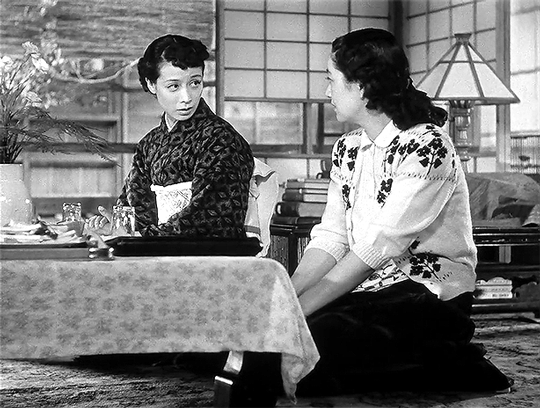
“Early Summer is about the difference between the married and the unmarried, how the married try to persuade or (worse) coerce the unmarried into getting married, and how maybe that isn’t always such a good idea. This theme is explicitly called out more than once in the film.
Early Summer further implies that there may be a good reason why some unmarried people, including Noriko (but not just Noriko), don't want to marry: they may be “that type of person,” as the young lesbian Fumi described herself in Takako Shimura's manga Aoi hana. This subtext rises briefly to the level of text at least once before being ambiguously dismissed.
Both Ozu and Hara remained unmarried until their deaths, and to my knowledge neither were ever credibly reported as having a romantic relationship with anyone. Per Donald Richie’s commentary on the Criterion release (referenced in the next post), Ozu was reported to become angry at any talk of his marrying. Meanwhile Hara, though termed “the eternal virgin” by a film producer for her film image, in real life had close friendships with many women, including a hair and makeup artist whose friendship with Hara began early on and continued after Hara retired into obscurity at the height of her career.
In modern terms we could therefore hypothesize Early Summer as a queer film subtly but firmly protesting compulsory heterosexuality, made by a (possibly) queer director and starring a (possibly) queer actor.
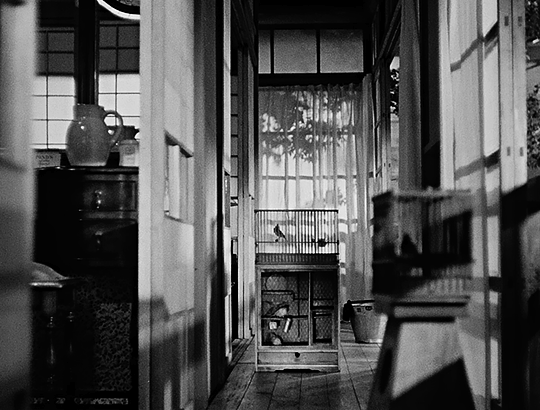
…
Early Summer opens with three establishing shots: first a shot of a dog walking freely on the beach with the ocean in the background, then a shot of a single bird in a cage outside, and then a final shot of birds in cages inside a house. This is the house in the oceanside town of Kamakura in which Noriko (Setsuko Hara’s character) lives, along with her brother Kōichi (Chishū Ryū), his wife Fumiko (Kuniko Miyake), Noriko and Koichi’s father (Ichiro Sugai) and mother (Chieko Higashiyama), and Kōichi and Fumiko’s two young boys.
If we wish, we can interpret the first and third shots as showing a strong contrast between freedom in nature on the one hand, and the restrictions imposed by society and the Japanese family system on the other. In this interpretation the second shot represents Noriko, who has a degree of independence that her mother and Fumiko do not have, but is still constrained by the bonds of family and society.
In the following scenes Kōichi takes an early train to his job as a physician, while Noriko goes to the Kita-Kamakura station to catch a later one. There she meets Kenkichi, another physician who works with Kōichi and who (along with his mother) is the family’s next-door neighbor. Kenkichi tells her that he’s been reading a book, implied to have been recommended by Noriko. The Criterion release describes it only as “this book,” but the BFI release names it as Les Thibaults.
Les Thibaults (published in Japanese as Chibō-ka no hitobito, and apparently relatively popular in Japan at the time) is a multi-volume French novel that begins as one of its protagonists is discovered writing passionate messages to a fellow schoolboy — something Ozu himself was apparently falsely accused of — and is then separated from his friend. Later volumes describe their diverging paths in life. Why might have Noriko recommended this particular novel to Kenkichi? Hold that thought.
We then see Noriko at work, as a secretary and executive assistant to the head of a small firm (Shūji Sano). As she talks with her boss regarding café recommendations, her best friend Aya (Chikage Awashima) arrives, there to collect payment for the boss’s spending at the restaurant her mother owns. Noriko’s boss wonders when they’ll both get married, and refers to them as “old maids.”
(Before becoming a movie actress, Chikage Awashima was a musumeyaku top star in the Takarazuka Revue and occasionally played “pants roles,” i.e., as a female character dressing as a man for plot reasons. Osamu Tezuka was a fan of hers, and she supposedly inspired the main character Sapphire, “born ... with a blue heart of a boy and a pink heart of a girl,” in his manga Princess Knight. Why might this be relevant to Early Summer? Again, hold that thought.)
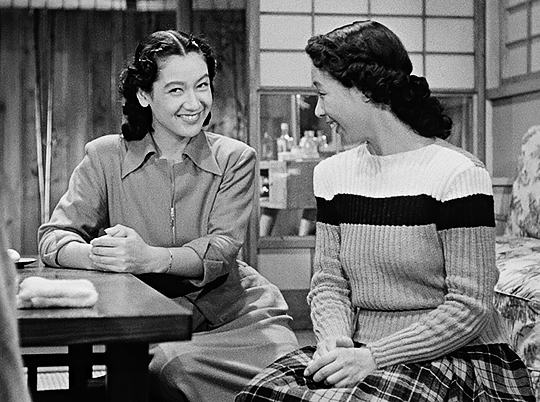
After work, Noriko meets Kōichi and Fumiko for dinner. While they eat, Kōichi complains about post-war women (“[They’ve] become so forward.”) and Noriko corrects him: “We've just taken our natural place.” Kōichi then claims that’s why Noriko can’t get married, and she rebukes him: “It’s not that I can’t. I could in a minute if I wanted to.” (Note: a bit of foreshadowing here.)
Next occur the two key events that set the main plot in motion. First, Noriko’s great-uncle (Seiji Miyaguchi) arrives for a visit. He wonders why she isn't married yet. “Some women don't want to get married,” he tells her. “Are you one of them?” Noriko laughs and leaves the room, but the seed has been planted in the minds of her family.
Noriko’s boss also thinks it's time for her to get married, and he has just the man for her: “He’s never been married. Not sure if he's still a virgin.” Her boss has photographs to show her, and won’t leave her leave without taking them.
Meanwhile Noriko and Aya mercilessly tease one of their married friends, and after attending another friend’s wedding have dinner with that friend and another married friend, with a side dish of sexual innuendo. One of the married friends brags about how she spent a rained-out honeymoon playing with a “spinning top”: “My husband is very good at it.” Her friend cautions her: “You shouldn't flaunt it in front of the single girls.”
However, Aya is not impressed with the implied amazingness of heterosexual intercourse: “Silly! We don’t play with tops, do we?” Noriko enthusiastically agrees with her: “That’s for children, isn’t it?” The debate between the married and the unmarried continues, after which Noriko goes home, where Kōichi and Fumiko are scheming regarding the marital candidate proposed by Noriko’s boss.
Kenkichi’s mother then visits Noriko’s mother, and tells her that a man from a detective agency has been asking about Noriko: “I realized it was about her marriage.” We also learn that Kenkichi’s wife died two years ago (leaving him with a young daughter), and that he's not interested in remarrying: “All he does since his wife died is read books” (like Les Thibaults). Finally, we learn that Kenkichi’s best friend, Noriko’s brother Shoji, went missing in the war.
We now come to the climax of the first half of the movie. As Noriko’s nephews and their friends play with their model train set downstairs (one nephew asking if their father will buy them more train track), Aya visits Noriko and they talk in her room upstairs. Their married friends have made various excuses for why they couldn’t also visit; Noriko recalls how close they were at school and laments their drifting apart.
Throughout the first half of Early Summer Noriko and Aya are shown as mirroring each other’s gestures and speech. That mirroring continues in this scene (for example, they sit down next to each other at the exact same time and in the exact same manner), and then a very interesting thing happens. Ozu’s typical modus operandi is to continue a shot until someone stops speaking or moving, or even until they leave the room. But here he cuts immediately from Noriko and Aya simultaneously raising their glasses to drink, to Noriko’s father and mother simultaneously bringing food to their lips, as they relax sitting on a street curb in town.
If I were to speculate about what this juxtaposition might mean, if anything, I’d speculate as follows: that Ozu intended to show that, whatever Aya and Noriko might be to each other, they are as close, secure, and happy in their relationship as Noriko’s mother and father are in theirs — as much a couple as any other in the film, but not formally recognized as such.
Noriko’s father tells his wife, “This may be the happiest time for our family,” although he’s sad at the thought of Noriko leaving. They continue their conversation, and then are interrupted by the site of a balloon rising into the sky. “Some child must be crying,” Noriko’s father remarks. “Remember how Kōichi cried when he lost his balloon?”

…
The good times continue as Noriko brings home a cake to eat with her sister-in-law Fumiko, and their neighbor Kenkichi drops in unexpectedly and is invited to share it with them. The scene re-introduces Kenkichi and brings up the subject of his remarrying — something he doesn’t want, but his mother (played by Haruko Sugimura) does.
…
In the meantime Noriko’s brother Kōichi has been pursuing the idea of a marriage between Noriko and an unseen bachelor first suggested by Noriko’s boss, including asking his friends and associates for more information on the proposed groom. The results are “very promising”: “He’s in the social register, and seems to be a fine businessman.” “How nice,” replies his mother, but, “how old is he?”
…
Then Noriko’s boss asks a few questions that we’ve been asking ourselves. While Noriko is away from work, Aya stops by, and the boss questions Aya on whether Noriko will go through with the match or not: “I don't understand her ... Is she interested in men?” Aya at first demurs: “What do you think?” Noriko’s boss has seen indications both ways, and presses the question: “Has she always been like that?” Aya responds in the affirmative. The questioning goes on. Aya tells him that Noriko’s apparently never been in love, “but she has an album of ... Hepburn photos this thick,” holding her thumb and forefinger about 4 centimeters apart.
Here we have the first of two translation issues. Aya actually refers to “Hepburn” without mentioning a given name. The Criterion subtitles — by Donald Richie, who should have known better — make this a reference to Audrey Hepburn, who’d had only small roles by then. It’s almost certain that this is instead a reference to Katherine Hepburn, who was a major star by the time Noriko would have entered middle school. Was the teenaged Noriko besotted by the androgynous beauty of Katharine Hepburn (who would have made a stunning otokoyaku)? It sure looks like it.
The subtext now threatens to become text, as Noriko’s boss learns that “Hepburn” refers to an American actress, and asks the obvious follow-up question about Noriko. In the Criterion subtitles it’s translated as “So she goes for women?” The BFI translation puts it more bluntly: “Is she queer?” What is Noriko’s boss really asking? Japanese speakers can correct me here, but I believe his actual question uses the term “hentai.”
Western fans are used to thinking of “hentai” as referring to pornography. However, my understanding is that at the time of the film “hentai” in colloquial Japanese would have referred specifically to sexual behavior that was considered abnormal. So if Noriko’s boss did use the term, another possible translation might have been “Is she a pervert?” Both the Criterion and BFI translations soften the question; in particular BFI’s “is she queer?”, while defensible, risks projecting our current ideas about “queer” (including its positive connotations) onto a film created in a different time.
In any case, Aya is determined to shut down any discussion of Noriko’s proclivities. “No!” she firmly replies. Noriko’s boss is apparently unconvinced: “You can never know. She’s very strange, in any case.” His prurient instincts aroused, Noriko’s boss then envisions another solution to the problem of Noriko, and queries Aya about it: “Why don’t you teach her?” “About what?” “Everything.” “What do you mean, everything?” He pats her shoulder and admonishes her: “Don’t try to be coy,” as we viewers pause to consider the implications of what he’s asking her to do.
Aya rejects this line of inquiry as well: “Don’t talk to me like that! That was rude!” Noriko's boss laughs, offers a half-hearted apology, and then (after telling Aya that Noriko won’t be back that day) invites her to lunch and quizzes her on her preferences in sushi: “Tuna” she says. He continues, “How about an open clam?” (which Donald Richie's commentary helpfully informs us is a euphemism for the vagina). “Sure,” she replies. “And a nice long rice roll?” “No, thank you!” His final words are, “You’re strange too,” and again I think I hear the word “hentai” enter the conversation.
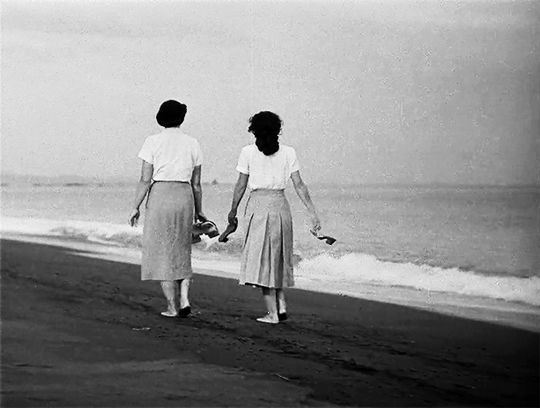
…
Recall that Kenkichi decided to accept an offer as a department head in a hospital in Akita, several hundred kilometers north of Tokyo and on the opposite coast. Noriko meets him in a café before her brother Kōichi is to host him at a farewell dinner party, and they talk about Shoji, Noriko’s other brother who went missing in action during the war. Kenkichi recalls how he and Shoji were best friends in school, often eating at this very café, indeed at this very table. Kenkichi tells Noriko that he still keeps a letter that Shoji sent him, with a stalk of wheat enclosed (probably indicating that Shoji was deployed in northern China). Noriko asks if she can have the letter, and Kenkichi agrees.
Afterward Noriko visits Kenkichi’s mother, while Kenkichi himself is still at his farewell party. Kenkichi's mother tells Noriko her secret dream (“please don’t tell Kenkichi”): “I just wish Kenkichi had gotten remarried to someone like you.” She apologizes and asks Noriko not to be angry (“It’s just a wish in my heart”), but Noriko stares at her with an intense expression (her usual smile absent), and asks her, “Do you mean it? ... Do you really feel that way about me?” Kenkichi’s mother apologizes again, but Noriko presses on: “You wouldn’t mind an old maid like me?” Then before Kenkichi’s mother can respond, Noriko speaks: “Then I accept.”
Kenkichi’s mother is incredulous. She asks Noriko several times to confirm what she’s saying, thanks Noriko effusively and weeps tears of joy at her good fortune, but continues to question Noriko about her decision even as Noriko leaves to go home. (Incidentally, this scene features a bravura performance by Haruko Sugimura.)
After she leaves the house, Noriko encounters Kenkichi, just returned from his farewell party. Noriko exchanges some small talk with him, but says absolutely nothing about what she just told his mother.
Noriko's decision then plays out across multiple scenes:
At first Kenkichi doesn’t understand what his mother is trying to tell him (“She accepted.” “Accepted what?”). When he finally gets the message (“She agreed to marry you. To become your wife!” “My wife?” “Yes. Isn’t it wonderful?”), he looks absolutely gobsmacked. His mother breaks down in tears again telling him how happy she is, and how happy he should be. He tries to play along (glumly echoing, “Yes, I’m happy”), but he looks for all the world like a man who would sooner eat nails than enter into another marriage.
Kenkichi’s mother doesn't understand why he’s not happy. She concludes, “What an odd boy you are.” The Japanese word here appears to be “hen,” which I understand to be a softer adjective than “hentai,” and not sexual in nature. But note that Kenkichi is now the third person after Noriko and Aya to be referred to as not normal in some way.
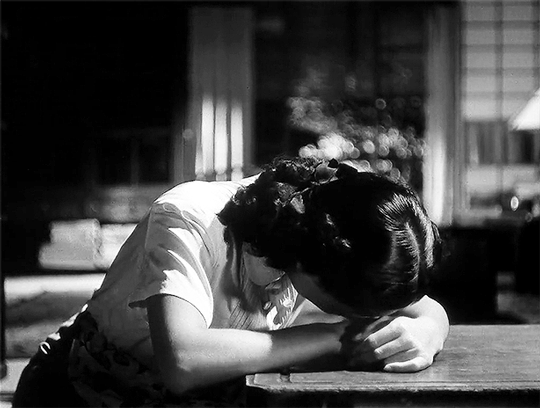
Meanwhile Noriko is interrogated about her decision by her family, especially by Kōichi, in a beautifully framed and shot scene — Noriko in white, her head bowed, her brother in black, barking questions like a prosecutor cross-examining a criminal. Noriko is unrepentant: “When his mother talked to me, I didn’t feel a moment’s hesitation. I suddenly felt I’d be happy with him.” Her parents retire upstairs to chew on their disappointment — Noriko walking silently past them on her way to her room — while Kōichi tells Fumiko, “What could we do now? She’s made up her mind. You know how she is.”
…
Meanwhile Noriko and Aya have their last scene together. It starts by echoing and completing the action at the end of their previous scene: then they raised their glasses together to drink, now they lower their glasses in a simultaneous gesture. Aya tells Noriko that she can’t believe Noriko would ever end up like this: she thought Noriko would be a modern woman living “Western-style, with a flower garden, listening to Chopin,” “wearing a white sweater, with a terrier in tow,” and greeting Aya in English — “Hello, how are you?”
Instead Aya now imagines Noriko wearing farmers clothes in rural Japan, speaking the local dialect. She playfully imitates country speech, and Noriko responds in kind: “Ya don’t look it, but ya talk like the locals.” “I figure to live in Akita when me and my man get hitched.” The subtext here I read as follows: Noriko knows how to pretend to be something she is not — a conventional heterosexual woman in a conventional heterosexual marriage — and she will accept doing so in her self-imposed exile from Tokyo, the price she must pay for avoiding what she considered to be a worse fate.
The tone then turns serious. Aya recalls meeting Kenkichi when they were in school, on a hiking trip with Noriko and her brother Shoji, and presses Noriko about her choice: “Did you already love him then?” “No, I had no particular feeling for him. ... I never imagined myself marrying him.” Noriko evades Aya’s questions about how she came to love Kenkichi, refusing time after time to acknowledge her feelings for him as those of love. Instead she insists, “No, I just feel I could trust him with all my heart and be happy.”
But trust Kenkichi for what? we want to ask Noriko. To respect her for who and what she is? To not want a conventional relationship with her? To not press her for sex or for children (after all, he already has one)? To keep her secrets, as she might keep any secret of his?
…
The family then gathers for one last commemorative photo. Without Noriko's salary they can no longer afford the house in Kamakura, so they break up: the parents to live with the great-uncle; Noriko to Akita with Kenkichi, his mother, and his daughter; and Kōichi, Fumiko, and their sons to some other less-expensive dwelling (perhaps an apartment in the Tokyo suburbs).
The parents recall when they moved into the house: “It was spring and Noriko had just turned 12.” Kōichi remembers that time as well: "She used to wear a ribbon in her hair, and she was always singing." But “children grow up so quickly,” her parents remark, and living together forever, "that's impossible."
Her usual smile nowhere in evidence, Noriko takes it all upon herself: “I’m sorry, I’ve broken up the family.” Despite reassurances from her father (“It’s not your fault. It was inevitable.”) she flees from the room, goes upstairs to her own room, and cries her heart out, distraught about the turn that her and their lives have taken.
The final scene shows Noriko’s parents at the great-uncle’s house, far from the sea. They glance at a wedding procession walking through the fields (“Look there. A bride is passing by. I wonder what sort of family she’s marrying into?”), think of Noriko, and resign themselves to the family's fate: “We shouldn’t ask for too much.” “We've been really happy.”
— Frank Hecker, “Ozu’s Early Summer Seems Pretty Darn Queer to Me”
#yasujiro ozu#ozu#queer history#setsuko hara#early summer#film criticism#queer film#gay subtext#queer coding#long post
47 notes
·
View notes
Text
the revue starlight and in stars and time parallels and analysis post
aka me rambling about how much I love both pieces of media cause I just finished ISAT for the first time today
While playing it I could not help but notice similarities between it and revue starlight, so here we go
heavy spoilers for both
also note that I haven’t like. fully 100% isat yet so I may be missing some things! don’t tell me them! I want to find them out for myself!
The Stage
Revstar’s whole thing is about theatre. That’s clear in the first 5 minutes of the show. But deeper than that, Revue Starlight itself is Starlight, the play within the story. Each character is Flora, Claire, the Tower, one of the Goddesses, all meeting on the night of the star festival. They all have a role to play— and deviating from it is terrifying. They have been the same characters, the same people, for so long, that when Hikari appears and upsets the order of everything, the entire narrative of the play is destroyed and reborn anew. The ending is changed.
What was once an ending of despair, where Flora and Claire were destined to part because of their longing for their wish, becomes an ending of love. Where they choose each other rather than the stars high above.
What was once a clear line of victory, Nana winning the Revues, annihilating everyone in her path, and being granted her eternal wish, becomes messy. She cannot win against Hikari. She cannot win against Karen. She never will. They’ve deviated too much from the script, and then her reenactment is over. Her wish can no longer be granted.
Flora and Claire’s promise to meet again is the same as Karen and Hikari’s, a promise that is forgotten. Was forgotten and unfulfilled for years and years, as the loops continued, until Hikari herself— with the power of a Giraffe, of course, to end those boring reenactments— intervened.
Siffrin forgot their wish for a long time, as well.
In Stars and Time is different— theatre isn’t really brought up until the library, where it’s mentioned that Siffrin enjoys watching plays. And over time, to him, the loops become one. He is an actor performing his lines, just as his friends are, and there can be no deviating from the script. Any scene that goes wrong must be erased and redone. Over and over. Say the line, why aren’t they acting properly, Act I, Scene I, Siffrin wakes up, it all repeats over and over. Encore.
Loop mentions, as time goes on, that Siffrin has become both a director and an actor.
Just like Nana. The director of her own reenactments of Starlight. She’s seen it all before, over and over, and she still loves it just as dearly. Loves her friends just as dearly. Everyone is safe acting out the roles she created for them. She will always win the Revues, and everyone will always perform Starlight together, on repeat.
The two of them both started as actors in their stories. But, they memorized their lines well, and then directed the others to perform the way they wanted them to. Perfectly.
When the characters start to deviate from their roles, when you don’t know how they will act anymore, when you don’t know how to act… what do you do?
You keep going until you can restart it from the beginning, of course. Next time, you can fix everything that went wrong.
There will always be a next time. Right?
Stars
Stars are so important. They symbolize wishes. Forgotten promises. Despair. Blinding light. Power.
In Revue Starlight, those two wish-granting red stars are blinding. The wishes they grant are truly unattainable. And if you keep longing for them, you’ll go blind. If you keep continuing your reenactments of the same year over and over and over, you’ll become blind to everything else around you. All you can do is continue climbing the tower, to reach those stars you so desperately long for. It’s unending. You will never reach them.
With isat, a red star appears— the first splash of colour— when Siffrin is trying to remember their home for the first time, with the King. They fight to remember, but that blinding red star… it’s too much. It’s all too much.
But, stars are unfeeling. They don’t have a will, so why do they have so much power?
I’m sure I could connect this all to Loop in some way but I uh. still do not get their whole deal. I think I missed a lot of their dialogue unfortunately when playing so I gotta do a new game to get it all :(
They definitely care for Siffrin a lot, that’s for sure.
Time
Yayyyy timeloops!!! They’re trapped in a timeloop of their own making! They’re too afraid to leave!!!
Nana and Siffrin both created these loops. To act out their favourite play, with their beloved friends, forever and ever and ever and ever and
The loops come from a place of love and severe abandonment issues but that’s just what being in late teens/early twenties is like you know. sometimes you just start a timeloop out of love!!
It’s selfish. It’s for the sake of protecting them from the future, from their inevitable parting.
With Nana, we unfortunately don’t get to learn too much about how she changed over the course of the timeloops. She started out much more withdrawn, and hesitant to call her friends her friends, but… of course, once the loops begin, she becomes confident. Always helping others with their problems. She knows they will always love her as long she stays the same. Fun fact! The only time we ever see the “original” Nana is in flashbacks in episode 7 and the prologue manga! That’s it! She’s been irreparably changed and she cannot go back!
Of course, if her friends found out they probably wouldn’t like her anymore. They’d probably abandon her. Well, it’s not like they’re not going to ever find out! It’ll all restart, even if they did.
I feel like Siffrin just. Cannot relax. Ever. Nana becomes relaxed in her eternity, but Siffrin is always on edge. Afraid to mess up their lines. Afraid they will find out. Eventually, they simply don’t care anymore, cause they can loop back and fix it all, but still… that anxiety is always present.
Nana’s stakes are much lower than saving the entire country and all the people that have been frozen in time, compared to Siffrin, so that makes sense
An Eternal Wish
They got what they wished for. To stay with their friends. For eternity. To never part, to never be left behind, to never forget ever again, to never be forgotten ever again.
But their wish was not what they wanted. Or maybe it was, in some way. Still. It was not what they needed.
Their friends will always stay the same. Their friends will never do anything more with their lives. They will always stay with you. As they are. They won’t grow old, they won’t learn, they won’t choose anything you don’t want them to, they will always love you.
They really aren’t alive, at that point. They truly are just actors.
But they still matter. They matter!!!
When the script deviates, the play ends, everything is burned into ashes, they are reborn into themselves again, they still choose you!!
They still love you!! It isn’t because of your eternity, your direction, your acting, nothing! It’s because it’s you!
And you’ve protected them for so long, in your own twisted selfish yet self-destructing way, yes, but you still protected them the only way you knew how.
You love them. And they love you.
And it’s terrifying.
They want to destroy your wish.
That wish you’ve held onto for all these years.
To rewrite the ending. So that everyone can be saved.
Even you.
And that’s all you needed, in the end.
You will inevitably part in the future, but for now… you can allow yourself to love, and be loved. To open up. To truly listen, to see how your friends have changed, how they will continue to change. And even when they all go off on their own paths, you will still love them. And they will still love you.
They see you, now. Not the character you’ve been acting as for so long.
okayyy that’s all for now! These are just my thoughts as I’ve just finished the game. I’m already planning to do a second playthrough so. yeah. I’ll probably change some of my opinions and interpretations of events when I get there!
game was good. 10/10 👍
revue starlight continues to remain in my mind forever when interacting with all media
#kris speaks#kris gaming#revue starlight#in stars and time#hopefully this is comprehensible!#I just wrote it all out in one sitting late at night so#we’ll see in the morning lol
22 notes
·
View notes